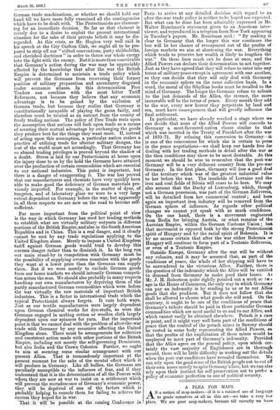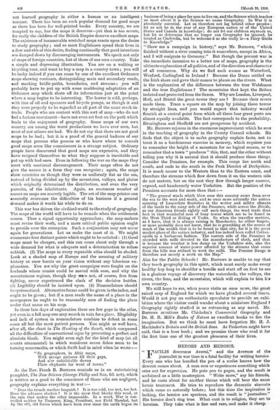A PLEA FOR MAPS.
AS a nation of map-makers—if it is a rational use of language to grade ourselves at all in this art—we take a very log place. We are poor map-makers, because till recently we have
not learned geography in either a human or an intelligent manner. There has been no such popular demand for good maps as there has been for well-printed books. Every country, we are tempted to say, has the maps it deserves—yet that is too severe, for really the children of the British Empire deserve excellent maps.
The existence of innumerable wretched maps reacts upon the desire to study geography ; and so most Englishmen spend their lives in a flow and ebb of this desire, finding continually that good intentions are damped down by discouraging instruments. We speak not only of maps of foreign countries, but of those of our own country. Take a simple and depressing illustration. You are on a walking or bicycling tour, and want to buy a map in a country town ; you will be lucky indeed if you can come by one of the excellent Ordnance maps showing contours, distinguishing main and secondary roads, and marking bridle-paths, boundaries, and streams ; you will probably have to put up with some maddening adaptation of an Ordnance map which shuts off its information just at the point where a map begins to be interesting. The horror is sold, perhaps, with tins of oil and spanners and bicycle pumps, as though it and they wore properly to be regarded as all part of the same stock-in- trade. People who are content with this sort of map—who do not feel a furious resentment—have not even set foot on the path which leads to the enjoyment of geography. Some maps of our own country are among the worst productions we have ever seen, but most of our atlases are bad. We do not say that there are not good maps to be had ; but it is a proof of the general badness of our maps that persons who possess or who know where to consult good maps seem like connoisseurs in a strange subject. Ordinary people have discovered that good maps are expensive, and they have resigned themselves to what they suppose is inevitable and put up with bad ones. Even in following the war on the maps they meet with continual discouragement. Their maps often do not give the names in a form they can recognize ; again, the maps • how countries as though they were as uniformly flat as the sea, instead of being divided up by the mountains, valleys, and plains which originally determined the distribution, and even the very pursuits, of the inhabitants. Again, an enormous number of names on maps are scarcely legible. The art of the map-printer can assuredly overcome the difficulties of his business if a general demand makes it worth his while to do so.
This war has driven the civilized world to the study of geography. The maps of the world will have to bo remade when the settlement comes. Thus a signal opportunity approaches ; the map-makers must revise their work, and a more critical public opinion ought to preside over the enterprise. Such a conjunction may not occur again for generations. Let us make the most of it. We might enumerate four distinct points which ought to be satisfied : (1) Good maps must be cheaper, and this can come about only through a wide demand for what is adequate and a determination to refuse rubbish. (2) The maps in every reputable atlas should be shaded. Look at a shaded map of Europe and the meaning of military history at once bursts on your vision without any laborious ex- planation. You see why the great campaigns were fought on the lowlands where armies could be moved with ease, and why the mountainous regions, though they were not, of course, free from fighting, never experienced the clash of the decisive battles. (3) Legibility should be insisted upon. (4) Nomenclature should be systematized. Alternative forms could be given in the index, and ought to be given ; but if a man reads the name of a place in the newspapers he ought to be reasonably sure of finding the place under that name on his map.
In these late days of exploration there are few gaps in the atlas, yet oven in a full map one may search in vain for a place. Illegibility and lack of system in nomenclature combine to defeat in some eases all but the most patient persons. You might as well have, after all, the chart in The Hunting of the Snark, which conquered all the difficulties of conventional signs by presenting a perfect and absolute blank. You might even sigh for the kind of map (at all events ornamental) in which wondrous ocean fishes seem to be turning somersaults, or which Swift had in mind when he wrote :-
" So geographers, in Afric maps, With savage pictures fill their gaps, And o'er unhabitablo downs
Place elephants for want of towns."
As the Rev. Frank It. Burrows reminds us in an entertaining pamphlet, The New Science (George Philip and Son, M. net), which is written as a goad to the conscience of those who are negligent, geography explains everything in war:— "Does the trench warfare languish ? It is too cold, too wet, too hot. Does the advance slacken ? It is the snow that blocks this road, or the rain that makes the other impassable. In a word, War is con- trolled neither by Emperor, King, President, nor Field Marshal, but by the old, old forces which have been ever since the earth began its
business of being a place for men to live on, and the Science which teaches us most about it is the Science we name Geography. In War it is absolutely essential. Let us therefore not lag behind other peoples ; let us not be in the rear of any European nation or of the United States and Canada in knowledge ; do not let our children reproach us, but let us determine that no longer can Geography be ignored, be treated as Cinderella, but be welcome d as she really is—a Fairy Guide to Knowledge."
" Show me a campaign in history," says Mr. Burrows, " which finished without a river coming into it somewhere, except in Africa, and I will emigrate to Germany." But though the present war is the immediate incentive to a better use of maps, geography is the ultimate explanation of all politics, and of the direction and character of all commerce. Why do we find such names as Waterford, Wexford, Carlingford in Ireland ? Because the Danes settled on the Irish shore and gave their names to places on the rivers. What is the explanation of the difference between the true Welshman and the true Englishman ? The mountains that kept the Briton isolated and protected from the Saxon. Why are London, Liverpool, Hull, and Bristol the 'great towns they are ? Because their rivers made them. Trace a square on the map by joining these towns by straight lines, and you would expect that industry would flourish at a central point from which all these four great ports are almost equally available. The fact corresponds to the probability. Birmingham and Sheffield are not prosperous by accident.
Mr. Burrows rejoices in the enormous improvement which he sees in the teaching of geography in the County Council schools. He finds that the object is to make geography explain facts, not to treat it as a burdensome exercise in memory, which requires you to remember the height of a mountain for no logical reason, or to remember that a town " produces " this, that, and the other without telling you why it is natural that it should produce those things. Consider the Pennines, for example. This range lies north and south, and ends to the south in the Peak District of Derbyshire. It is much nearer to the Western than to the Eastern coast, and therefore the streams which flow down from it on the western side do not mature, but on the oast they flow through longer courser, expand, and handsomely water Yorkshire. But the position of the Pennines accounts for more than that :-
" The general winds which blow over this country come from over the sea to the west and south, and so once more naturally the cotton spinning of Lancashire flourishes in the wetter and milder climate of the lands to the rainy side of the Pennines, while across the Divide, as our American friends rightly call such things, the wool trade does best in that wonderful nest of busy towns which are to be found in the West Third or Riding of Yorks. So when the traveller mutters, as I have, that it is always raining in Manchester, he either forgets, or more probably does not know, that he is grumbling at the source of much of the wealth that is to be found in that city, for it is the great market-place of the cotton industry, and has indeed been called Cotton- opolis in a barbarous fashion. The eastern side of the Pennines is crowded with mills devoted to the manufacture of cloth, and that is because the weather is less damp on the Yorkshire side, also the superior amount of water-power afforded by the streams that come from the hills was utilized to work the mill.' The Pennine Range is therefore not merely a mark on the Map."
Alas for the Public Schools ! Mr. Burrows is unable to say that they teach geography in this spirit, which must surely make every healthy boy long to shoulder a bundle and start off on foot to see in a glorious voyage of discovery the watersheds, 'the valleys, the rivers, the fens, and the mountains, which will explain to him h:s
own country.
We still hops to see, when peace visits us once more, the great raised map of England for which we have pleaded several times. Would it not pay an enthusiastic speculator to provide an exhi- bition where the visitor could wander about a miniature. England ? Geography rightly studied is as entrancing as any novel. Mr. Burrows mentions Mr. Chisholm's Commercial Geography and Dr. H. R. Mill's Realm of Nature as excellent books to fire the imagination. But we think he must have forgotten Mr. H. J. Mackinder's Britain and the British Seas. As Pinkerton might have said, that is a boss book ; and we promise those who read it for the first time one of the greatest pleasures of their lives.



























 Previous page
Previous page